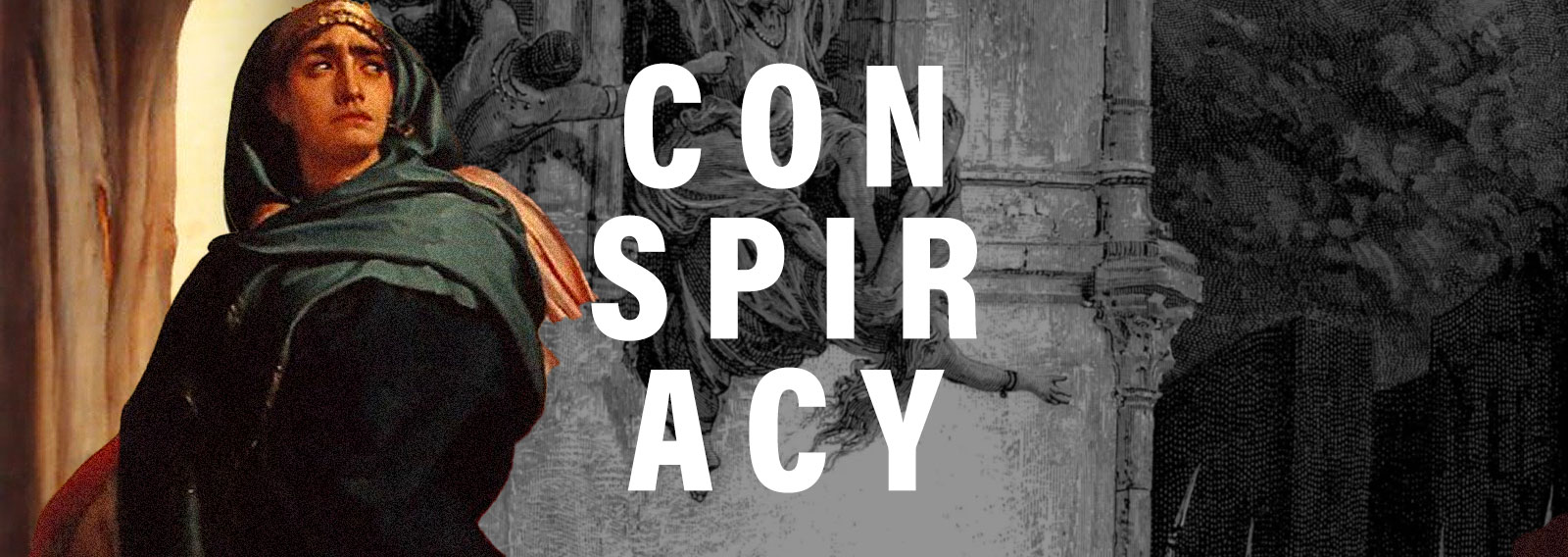“’And the rulers take counsel together.’ They go about their warfare craftily, not with foolish haste, but deliberately. They use all the skill which art can give. Like Pharoah, they cry, ‘Let us deal wisely with them.’ O that men were half as careful in God’s service to serve him wisely, as his enemies are to attack his kingdom craftily. Sinners have their wits about them, and yet saints are dull.”[1]
Charles Haddon Spurgeon
In two previous pieces, we have explored an extensive theology of conspiracy in the Scriptures, but our theology is incomplete, dangerously so, without the final pillar which we will discuss in this piece. We started by examining whether or not Christians should engage with the topic at all, and we knocked down one of the key arguments that dissuades Christians from this topic.
Next we explored how common direct references to conspiracy are in the Bible. But our theology of conspiracy is deficient without the final piece of the puzzle; the malicious evil behind conspiracy. Conspiracy is one of the key means through which evil extends itself in this world, and we are going to examine what the Scriptures say about that in this piece. By conspiracy, I mean people plotting in secret to achieve wicked ends.
The most complete Biblical view of conspiracy must account for the true source of conspiracy; evil and dark forces emanating into this world and working in dark and seedy places and seeking to subvert, influence and harm people. The Old and New Testaments give us a very detailed picture of how evil works. But this is rarely touched on by ministers. I think this is in part because many ministers focus in on the individual application of the principles taught, rather than piecing together the fuller picture of what God is showing us in his word.
We noted in our last piece that where we see corruption, there we will find conspiracy. As corruption increases, so too does conspiracy increase. This corruption comes from direct evil working behind the scenes. This is where many decent Christians’ perspectives on corruption and evil fall short of the Biblical worldview. The Scriptures assume that the evil in this world finds its source in spiritual evil, which manifests in two ways; the evil of sin in the human heart and evil that is not of this world.
For instance, when God wanted to show Ezekiel why his people were in such a bad state, he showed him something which should be fundamental to our understanding of evil and conspiracy. He showed Ezekiel behind the curtain:
“In the sixth year, in the sixth month, on the fifth day of the month, as I sat in my house, with the elders of Judah sitting before me, the hand of the Lord God fell upon me there. 2 Then I looked, and behold, a form that had the appearance of a man. Below what appeared to be his waist was fire, and above his waist was something like the appearance of brightness, like gleaming metal. 3 He put out the form of a hand and took me by a lock of my head, and the Spirit lifted me up between earth and heaven and brought me in visions of God to Jerusalem, to the entrance of the gateway of the inner court that faces north, where was the seat of the image of jealousy, which provokes to jealousy. 4 And behold, the glory of the God of Israel was there, like the vision that I saw in the valley.
5 Then he said to me, “Son of man, lift up your eyes now toward the north.” So I lifted up my eyes toward the north, and behold, north of the altar gate, in the entrance, was this image of jealousy. 6 And he said to me, “Son of man, do you see what they are doing, the great abominations that the house of Israel are committing here, to drive me far from my sanctuary? But you will see still greater abominations.”
7 And he brought me to the entrance of the court, and when I looked, behold, there was a hole in the wall. 8 Then he said to me, “Son of man, dig in the wall.” So I dug in the wall, and behold, there was an entrance. 9 And he said to me, “Go in, and see the vile abominations that they are committing here.” 10 So I went in and saw. And there, engraved on the wall all around, was every form of creeping things and loathsome beasts, and all the idols of the house of Israel. 11 And before them stood seventy men of the elders of the house of Israel, with Jaazaniah the son of Shaphan standing among them. Each had his censer in his hand, and the smoke of the cloud of incense went up. 12 Then he said to me, “Son of man, have you seen what the elders of the house of Israel are doing in the dark, each in his room of pictures? For they say, ‘The Lord does not see us, the Lord has forsaken the land.’” 13 He said also to me, “You will see still greater abominations that they commit.”
14 Then he brought me to the entrance of the north gate of the house of the Lord, and behold, there sat women weeping for Tammuz. 15 Then he said to me, “Have you seen this, O son of man? You will see still greater abominations than these.”
16 And he brought me into the inner court of the house of the Lord. And behold, at the entrance of the temple of the Lord, between the porch and the altar, were about twenty-five men, with their backs to the temple of the Lord, and their faces toward the east, worshiping the sun toward the east. 17 Then he said to me, “Have you seen this, O son of man? Is it too light a thing for the house of Judah to commit the abominations that they commit here, that they should fill the land with violence and provoke me still further to anger? Behold, they put the branch to their nose. 18 Therefore I will act in wrath. My eye will not spare, nor will I have pity. And though they cry in my ears with a loud voice, I will not hear them.”
Ezekiel 8: 1-18
A lot of good Christians have the idea that their immoral political leaders are just average, decent people, that are fallen but are just trying to do their best. In the case of Judah in the days of Ezekiel, God takes the prophet behind the curtains to show him that the outward corruption he sees emanates from demon worship behind the scenes. The Bible’s view is that where there is corruption, it emanates from an evil source.
Where corruption increases, conspiracy increases, because where corruption increases the influence of demons is increasing, and demons work in the darkness. By the time a nation gets to open demon worship, which eventually happened in Israel (Deut. 32:17; Ps. 106:37), it has been doing so in the dark for some time. Evil flourishes in the darkness (Eph. 5:7-11), but as evil increases, it does not like to remain hidden, it becomes arrogant, proud, and seeks to flaunt itself.
Without conspiracy, that is without the wicked plotting in secret, evil could not flourish in this world as it does. This is not to say that conspiracy is the only means of the extension of evil into the world, it is not, the sinful heart of man is central to the evil we experience in the world. But man was helped in his fall by the chief conspirator himself. Conspiracy is intrinsic to how evil gains supremacy because evil needs to remain hidden until it has enough power to be unchallenged.[2] Darkness does not feel comfortable in the light unless it can first dim the light.
Paul tells us in one of the most well-known passages in the Bible, that our true battle is not against human beings, but against dark and evil forces,
“Finally, be strong in the Lord and in the strength of his might. 11 Put on the whole armor of God, that you may be able to stand against the schemes of the devil. 12 For we do not wrestle against flesh and blood, but against the rulers, against the authorities, against the cosmic powers over this present darkness, against the spiritual forces of evil in the heavenly places. 13 Therefore take up the whole armor of God, that you may be able to withstand in the evil day, and having done all, to stand firm.”
Ephesians 6:10-13
Paul explicitly tells us that this world is ruled by evil demonic powers. But they are not just disembodied spirits, that can cause people some annoyance from time to time, they are far more than that. They are “rulers”, they are exercisers of authority, they are the real-world powers that are responsible for or “of” this present darkness, and they are evil spiritual forces. They originate in the Spiritual realm. Paul is not shy about who rules this world from the shadowy spiritual realm, the Devil and his minions.
Most orthodox Christians understand this at some level. But for many people, it is so far removed from their everyday conscious experience. Many people do not take on board the worldview that Paul is presenting us with. He is saying that the powerful men (and now women too) you see “ruling” the world, do not really rule the world, they are simply front men (and front women). The true authorities are the demonic powers that lie behind the people ruling the world. To the extent that good men exist in leadership positions in the world, they are working in a system that is inherently corrupted by evil.
Ezekiel gives us insight into how this works, as does Daniel. In Daniel 10 we read that Daniel was praying and mourning for 3 weeks, and then he gets this interesting visit from an apparent Angel/Watcher/son of God (‘benoy elohim’), that says to him,
“Then he said to me, ‘Fear not, Daniel, for from the first day that you set your heart to understand and humbled yourself before your God, your words have been heard, and I have come because of your words. 13 The prince of the kingdom of Persia withstood me twenty-one days, but Michael, one of the chief princes, came to help me, for I was left there with the kings of Persia, 14 and came to make you understand what is to happen to your people in the latter days. For the vision is for days yet to come…
“…20 Then he said, ‘Do you know why I have come to you? But now I will return to fight against the prince of Persia; and when I go out, behold, the prince of Greece will come. 21 But I will tell you what is inscribed in the book of truth: there is none who contends by my side against these except Michael, your prince.” (Dan. 10:12-14, 20-21).
Daniel receives a supernatural visit from a supernatural prince. Remember the word “prince” in many contexts means ruler, not the son of the ruler as we use it. We get our word “principalities” from this word, which means rulers or powers. This supernatural being was resisted by the supernatural “prince of Persia” who appears to be in alliance with the “prince of Greece” and both are against the prince of the Jews, Michael, whom we know is an archangel (Rev. 12:7).
So, Daniel is shown a small glimpse behind the curtain of the principalities that Paul writes about in Ephesians 6. The principalities are these princes who appear to have some kind of power and authority over the nations, these high angels are also referred to as “benoy elohim” or “sons of God” (Deut. 32:8; Job 1:6, 2:1, 38:7, Ps. 82:1-8). Their power is real and it has a tangible spiritual effect on this angel/Watcher that has visited Daniel. It is almost certain that Paul, at least in part, is building on passages like this as he presents his summary of the principalities in Ephesians 6.
The evil we see in the world does not come from sin alone, it also comes from wicked spiritual forces that have powers over kingdoms. They can do combat with angels and Watchers (apparently another title for high angels, cf. Dan. 4:17) and appear to be very similar in nature to the angels and Watchers. It stands to reason then that they are the fallen chief angels, and they stand at the top of the power hierarchy of this world. They work, at least in part, through conspiratorial means in these kingdoms.
That is why we should not be surprised at Jezebel’s pattern of behaviour. She was one of the prime examples of “the power behind the throne” in history. We first encounter Jezebel in 1 Kings 16:
“And Ahab the son of Omri did evil in the sight of the Lord, more than all who were before him. 31 And as if it had been a light thing for him to walk in the sins of Jeroboam the son of Nebat, he took for his wife Jezebel the daughter of Ethbaal king of the Sidonians, and went and served Baal and worshiped him.”
1 Kings 16:30-31
Jezebel was in many ways an ancient diplomat. This was one of the roles that high-level marriages played in ancient kingdoms. Powerful men and rulers would marry their daughters off to foreign kingdoms they wished to have alliances with. Alliances meant more than just trade or war partners. Alliances were a means of influencing other nations, seeking to have a say in and direct their policies and culture.
A simple and practical way to do this was to place a well-trained and skilled woman into the household of a powerful foreign people, especially the king’s household. This brought the nations closer together because now their respective royal families were extended families, and it allowed these foreign entities to have a say in the direction of the nation they were now connected to.
It was ancient diplomacy, and this was one of the reasons that God forbade Israelite men, including kings, from marrying foreign women. Because men are often powerless before their wives and are often unable, or unwilling, to stop the foreign influences these marriages brought into their nation. This was true of men even in ancient patriarchal times.
Jezebel appears to have been particularly skilled in her role as a foreign influencer, and Ahab appears to have been particularly weak at resisting her influence, because he capitulated completely to her foreign policy goals. She turned the king of Yahweh’s kingdom into a flag waving promoter of Baal, the god of the Phoenicians (Canaanites). This is the goal of foreign relations, to get foreign nations to align with your nation’s interests as much as possible. In modern terms, Jezebel was a successful and influential promoter of Phoenician exceptionalism, and she was also an agent of pure evil.
Jezebel turned the worship of Israel towards the licentious and idolatrous practice of Baal and Asherah worship. She murdered and severely persecuted the prophets of the Lord (1 Kings 18:4, 13), she empowered the prophets of Baal and brought them into the royal household giving them a privileged position (1 Kings 18:19), and she usurped the king’s role in managing the direction of the religious state of the Israelite people (1 Kings 19:1). She was in every way an agent of the dark and evil forces that come into this world through the influence of the demons that the pagan worshippers followed.
So, it should surprise absolutely no one that she is at the centre of one of the most famous and grievous conspiracies in all the Bible (not the absolute most, we will get to that one). In 2 Kings 21, we read that Ahab wanted the vineyard of a man called Naboth. Naboth refuses, “3 But Naboth said to Ahab, “The Lord forbid that I should give you the inheritance of my fathers” (1 Kings 21:3). Contrary to what many modern conservatives think, the Old Testament property laws were not like our modern private property laws. Land could not just be sold in perpetuity and transferred at will, the Bible supported liberal trade, but not free trade. An Israelite who had fallen on hard times could sell his property to pay for his debts, but the property was to be returned to his immediate family or eligible nearest kin in the year of Jubilee through the process of redemption. Therefore, a good man, especially a man of means would not sell his family’s property, because it was their rightful inheritance (Prov. 13:22).
Ahab was depressed because Naboth refused his offer, so Jezebel consoles her weak-minded husband and tells him that she will get him the vineyard. Her plan? This:
“So she wrote letters in Ahab’s name and sealed them with his seal, and she sent the letters to the elders and the leaders who lived with Naboth in his city. 9 And she wrote in the letters, “Proclaim a fast, and set Naboth at the head of the people. 10 And set two worthless men opposite him, and let them bring a charge against him, saying, ‘You have cursed God and the king.’ Then take him out and stone him to death.” 11 And the men of his city, the elders and the leaders who lived in his city, did as Jezebel had sent word to them. As it was written in the letters that she had sent to them, 12 they proclaimed a fast and set Naboth at the head of the people. 13 And the two worthless men came in and sat opposite him. And the worthless men brought a charge against Naboth in the presence of the people, saying, “Naboth cursed God and the king.” So they took him outside the city and stoned him to death with stones. 14 Then they sent to Jezebel, saying, “Naboth has been stoned; he is dead.”
1 Kings 21:8-14
Jezebel acted exactly as you would expect an agent of evil to act. She conspired with her wicked agents to bring a good man down.
Conspiracy is not the sole province of the foreign wives of corrupt kings. But as corruption increases, you will see conspiracy increase, because darkness loves to work in darkness. There was no open, in the light, way to get this man to change his mind, ergo Jezebel believed he needed to be dealt with by the strategies of shadows and darkness. Evils knows how to effectively use lies and shadows.
The consistency of this effect evil has in our world is remarkable. We showed in our last piece just how common conspiracy was in the Old Testament, and that was only from direct uses of the word itself in Scripture. It is even more common than that. In fact, conspiracy is so common in the experience of the people of the Old Testament, particularly the powerful, that it was incorporated into their worship in the Psalms. Here is a powerful example, Psalm 64:
1 Hear my voice, O God, in my complaint;
preserve my life from dread of the enemy.
2 Hide me from the secret plots of the wicked,
from the throng of evildoers,
3 who whet their tongues like swords,
who aim bitter words like arrows,
4 shooting from ambush at the blameless,
shooting at him suddenly and without fear.
5 They hold fast to their evil purpose;
they talk of laying snares secretly,
thinking, “Who can see them?”
6 They search out injustice,
saying, “We have accomplished a diligent search.”
For the inward mind and heart of a man are deep.7 But God shoots his arrow at them;
they are wounded suddenly.
8 They are brought to ruin, with their own tongues turned against them;
all who see them will wag their heads.
9 Then all mankind fears;
they tell what God has brought about
and ponder what he has done.10 Let the righteous one rejoice in the Lord
Psalm 64
and take refuge in him!
Let all the upright in heart exult!
This theme is common in the Psalms and talked about in many different ways and contexts. Here are a few other examples:
- Psalm 38:12, “Those who seek my life lay their snares; those who seek my hurt speak of ruin and meditate treachery all day long.”
- Psalm 140:5, The arrogant have hidden a trap for me, and with cords they have spread a net; beside the way they have set snares for me. Selah
- Psalm 141:9, “Keep me from the trap that they have laid for me and from the snares of evildoers!”
- Psalm 37:12, “The wicked plots against the righteous and gnashes his teeth at him,…”
- Psalm 83:1-3, “O God, do not keep silence; do not hold your peace or be still, O God! 2 For behold, your enemies make an uproar; those who hate you have raised their heads. 3 They lay crafty plans against your people; they consult together against your treasured ones.”
The Psalm writers wanted God’s people to be thoroughly aware that evil men were plotting against them. Their consistent emphasis proves this, “They lay crafty plans against your people…”
You would think that any topic which the Psalms speak about consistently and often would be recognized as a valid realm of biblical study. But my Evangelical Dictionary of Theology[3] skips from “Conservation” to “Constantinople, Council of” with no mention of a section on “Conspiracy”. My Kindle Edition of the Catholic Catechism has one reference directly to conspiracy,
“Speaking of the ‘vast conspiracy that certain men have formed for the annihilation of Christianity,’ the Pope denounced their boasted separation of Church and State as “equivalent to the separation of human laws from Christian and divine legislation. For as soon as the State refuses to give to God what belongs to God, by necessary consequences it refuses to give to citizens what as human beings they have a right to receive. The reason is that the rights of man derive from his duties toward God.’ Any separation built on these premises is a practical denial of the Church’s right to existence. It is another name for political atheism.”[4] (emphasis added)
The Catechism also uses the word conspire twice, but only in a general sense of “events came together” or “events conspired” to produce such and such a result. However, at least the Catholic Catechism recognizes the reality of conspiracies in the world, and that there is ultimately an anti-God source for these conspiracies. One may disagree with certain elements of this Catholic argument about the separation of Church and State (though not all of it, certainly we should give to God what is God’s), but one can only agree that the Biblical worldview must recognize that evil conspires to destroy all that is good, and that of course especially pertains to Christianity and its influence on governments. It is remarkable that the Evangelical dictionary of theology skirts the issue so completely.
The Old Testament is adamant, again and again, and again, that conspiracy is one of the means through which evil emanates into this world. Indeed, the Old Testament law was written specifically to undermine the ability of evil men, and women, in power to engage in conspiracy to maintain their power. Many of the rituals and rights of the ancient pagan religions were closely guarded secrets of a specially trained priesthood, who had claimed to have the only right to know and access such divine knowledge. This is how these priesthoods maintained their privilege and power. They held the esoteric “divine knowledge” closely in their ordained priesthoods so that they could not be questioned or replaced. What we today call the occult, which as we all know means secret knowledge, finds its origin in these pagan rights being suppressed by the early Roman Christianity[5]. Secrecy was and is intrinsic to pagan religion; hence why they are often referred to as “Mystery cults”.
The Old Testament law on the other hand was open for all to read and for all to use to judge the practices of the Levitical priests. Any Israelite could examine the Biblical law and use it to challenge those who were in power. Which of course happened; Amos is an example of this (c.f. Amos 1:1), but there are others. The Biblical knowledge was not guarded by an occultic, secret, priesthood, with esoteric knowledge but instead was open to all to know. The priests of Israel were also not selected via a process of secret examination but were hereditary guardians of this open knowledge. All Israelites were allowed, indeed, expected to intimately know the law (cf. Deut. 4-6). In other words, in many ways, the Old Testament law was designed to undermine the secrecy bred by these dark and evil principalities.
This is true of the New Testament as well. Just a chapter before Paul’s famous statements about the principalities and powers in Ephesians 6, we read this in Ephesians 5:
“Let no one deceive you with empty words, for because of these things the wrath of God comes upon the sons of disobedience. 7 Therefore do not become partners with them; 8 for at one time you were darkness, but now you are light in the Lord. Walk as children of light 9 (for the fruit of light is found in all that is good and right and true), 10 and try to discern what is pleasing to the Lord. 11 Take no part in the unfruitful works of darkness, but instead expose them. 12 For it is shameful even to speak of the things that they do in secret. 13 But when anything is exposed by the light, it becomes visible, 14 for anything that becomes visible is light. Therefore it says, “Awake, O sleeper, and arise from the dead, and Christ will shine on you.”
Ephesians 5:6-14
Christianity is inherently designed to undermine the evil and dark elements of the ways of the “sons of disobedience” which flourish in the shadows. In precisely the same way the Old Testament law was. Evil needs, according to this passage, darkness and secrecy. Conversely, darkness and secrecy promote and foster evil. Therefore, shun practices that require darkness and secrecy.
It is significant that the Word of God tells us from the very beginning (Gen. 1) that our God is the Creator who speaks light into the darkness, and we are to imitate him in this, “8 for at one time you were darkness, but now you are light in the Lord. Walk as children of light 9 (for the fruit of light is found in all that is good and right and true), 10 and try to discern what is pleasing to the Lord.” It is Christlike to seek to live in the light rather than in the dark:
“This is the message we have heard from him and proclaim to you, that God is light, and in him is no darkness at all. 6 If we say we have fellowship with him while we walk in darkness, we lie and do not practice the truth. 7 But if we walk in the light, as he is in the light, we have fellowship with one another, and the blood of Jesus his Son cleanses us from all sin.”
1 John 1:5-7
Conspirators need darkness and secrecy to flourish, Paul says walk in the light and be open. John says walk in the light and be open. Jesus says walk in the light and be open. Understanding the ways of wickedness and conspiracy, not intimately but intellectually, is inherently part of the Christian faith. Because Christianity is the answer to all the evil that is brought into the world by the agents of the evil principalities. This is not a minor aspect of our faith. It is a major emphasis in the Old Testament, and indeed in the New as well. Let me demonstrate this with a couple of important final examples.
It is remarkable how little attention the topic of conspiracy gets from the church and teachers in today’s world, especially considering that we serve a Lord who was killed in a wicked conspiracy that was carried out by the agents of those evil principalities.
We read in Matthew 26:
“When Jesus had finished all these sayings, he said to his disciples, 2 “You know that after two days the Passover is coming, and the Son of Man will be delivered up to be crucified.”
“3 Then the chief priests and the elders of the people gathered in the palace of the high priest, whose name was Caiaphas, 4 and plotted together in order to arrest Jesus by stealth and kill him. 5 But they said, “Not during the feast, lest there be an uproar among the people.”
Matthew 26:1-5
Jesus was popular among the people. How could he not be, he was full of grace and truth, he did incredible miracles, taught wise teachings, and, most significantly, he confronted the wicked people in power (cf. Matt. 23, for instance). So, the leaders of the Jewish people “plotted” a secret way to kill this good and righteous man.
Their opportunity comes when Judas seeks to betray Jesus, “14 Then one of the twelve, whose name was Judas Iscariot, went to the chief priests 15 and said, “What will you give me if I deliver him over to you?” And they paid him thirty pieces of silver. 16 And from that moment he sought an opportunity to betray him” (Matt 26:14-16). It is significant that Luke (22:3-6) tells us that before Judas did this Satan entered him, and John tells us that just before Judas goes and sells him out Satan again enters him (John 13:27). This is a conspiracy to kill the Lord of heaven and earth, of course, the Devil is going to be central to this plot.
And because this is a conspiracy, it requires darkness and secrecy, and therefore the agents of the Jewish leaders come and take Jesus at night, “And it was night” (John 13:30).
“At that hour Jesus said to the crowds, “Have you come out as against a robber, with swords and clubs to capture me? Day after day I sat in the temple teaching, and you did not seize me. 56 But all this has taken place that the Scriptures of the prophets might be fulfilled.” Then all the disciples left him and fled.”
Matthew 26:55-56
“52 Then Jesus said to the chief priests and officers of the temple and elders, who had come out against him, “Have you come out as against a robber, with swords and clubs? 53 When I was with you day after day in the temple, you did not lay hands on me. But this is your hour, and the power of darkness.”
Luke 22:52-53
“But this is your hour, and the power of darkness.” Evil took Jesus under the cover of darkness, secrecy and conspiracy. And contrary to all justice and righteous practice, the chief priests and the Pharisees carry on Jesus’ trial at night, where there are few witnesses, and plenty of opportunity to bring forward false witnesses to condemn a righteous man with unrighteous accusations (Matt 26:57-68). To again emphasize the dark hour of this false trial, Peter denies his Lord three times before the rooster crows and dawn breaks (Matt. 26:69-75). Then we read, “When morning came, all the chief priests and the elders of the people took counsel against Jesus to put him to death. 2 And they bound him and led him away and delivered him over to Pilate the governor.”
Matthew 27:1-2
Our own Lord was betrayed in a dark and evil conspiracy, inspired by the Devil and carried out, as many true works of evil, in the cover of darkness. Jesus was killed by the “sons of disobedience” at their favourite hour, the hour of shadows and stalking demons, the “power of darkness”. Jesus himself identified the source of the evil that wanted to kill him earlier in his ministry. He says to the Jews who want to kill him “44 You are of your father the devil, and your will is to do your father’s desires. He was a murderer from the beginning, and does not stand in the truth, because there is no truth in him. When he lies, he speaks out of his own character, for he is a liar and the father of lies.”
John 8:44
The New Testament is not shy about evil, indeed, evil is a requirement for the gospel story, because the gospel story is the answer to evil. Jesus and his ministry is the answer to evil. In fact, conspiracy is not just an important theme in the Scriptures, it is a vital component of the gospel story, and it is central to what happened to our Lord in the gospel story. Our Lord and Saviour was killed by evil men in powerful positions, who were given over to the Lord of Darkness, did the works of darkness, secrecy and conspiracy, and who took and destroyed Jesus at night, when they were covered by the “power of darkness”. This is central to the Christian understanding of how and why our Lord was killed, and how evil power works in this world.
Jesus was not shy about warning his disciples how common this sort of evil is in our world, “16 Behold, I am sending you out as sheep in the midst of wolves, so be wise as serpents and innocent as doves” (Matt. 10:16). Jesus and his disciples experienced the same kind of corruption that Jeremiah and other prophets experienced. Jeremiah was particularly vocal about this experience, “May a cry be heard from their houses, when you bring the plunderer suddenly upon them! For they have dug a pit to take me and laid snares for my feet” (Jer. 18:22).
The Scriptures are incredibly clear about how evil works in this world, and a very powerful part of how evil works and extends itself in this world is through conspiracy, through shadow, darkness, and secrecy. It is such a remarkably prominent theme one cannot help but wonder why you don’t hear much taught about this in the modern church. It was not always this way, as we see from the Spurgeon quote at the start of this piece. Also. as John Calvin notes:
“Then, on the other hand, Ezekiel inveighs against them in no milder terms. ‘There is a conspiracy of her prophets in the midst thereof, like a roaring lion ravening the prey; they have devoured souls.’ ‘Her priests have violated my law, and profaned mine holy things,’ (Eze 22: 25, 26). There is more to the same purpose. Similar complaints abound throughout the prophets; nothing is of more frequent recurrence.[6]
Calvin notes how frequent it is for the prophets to complain that evil men were conspiring against them and God. Constantly the prophets in the Bible talk about how they are assailed by those who plot against them. David wrote songs about this. Jesus warned about this. The Apostles experienced this (e.g. Acts 23:12-15). Yet today the Church is very quiet on this topic, at least from this perspective.
Perhaps the modern propaganda and preponderance of many absurd conspiracies have caused the watchmen in the church to forget that this is an important part of understanding how evil works in the world. Maybe, as in other eras, this is just a part of the knowledge of Scripture that is forgotten and lost and needs to be reinvigorated, just as sola-scriptura and sola-fide, or liberty of conscience were in a past era? I can’t answer why this is the case, I can simply point to what the Scriptures say, and they say a lot about conspiracy.
What I can say for sure is the Bible warns us very deeply about how evil works in the world. They also very clearly warn us about how we should be wise as serpents to these works of evil, and as innocent as doves and lambs in our own dealings with people. Such has always been what the righteous have faced and such has always been how the righteous are called to live. We live in a world ruled by the evil one, and therefore, we should not be surprised when we see his tactics being used all around us.
Bless you. Walk in the light as our Lord Jesus is in the light.
[1] Charles Haddon Spurgeon, The Treasury of David, Psalm 2, p11.
[2] Consider this example, crime. In a city run by relatively honest men you still have crime and corruption, but the criminals do everything they can to remain sheltered by secrecy and darkness, so as not to get caught. But as the city becomes more corrupt evil becomes emboldened and criminals can operate more openly. This is seen in high crime cities in places like South Africa, and other areas, where crime is so rarely punished, that criminals will walk up to a car at the street lights, smash the window, take what they want, including the car in some instances, and just move on as if nothing happened. This situation was described to me by someone I know who lived in such a place. But it is also observed in different places around the world. The higher the preponderance of good men the more crime and evil needs to work in secrecy, the lower the preponderance of good men the less it needs to work in secrecy.
Broken windows policing is loosely based on understanding this principle. Police recognize that if the culture of a city says crime will likely not be punished, then criminals will more likely commit crimes.
[3] Elwell, Evangelical Dictionary of Theology
[4] Hardon, John. The Catholic Catechism . The Crown Publishing Group. Kindle Edition.
[5] Bury, J. B. The Cambridge Medieval History Volume 1, pp112-113. Bury records precisely when the old pagan religions went underground, to protect themselves from the New Christianity First policies of the Christianised Roman Emperors. The pagan rites did not disappear, they became a private cult of those who continued to believe in them.
[6] Calvin, John. Institutes of the Christian Religion. Kindle Edition.




















